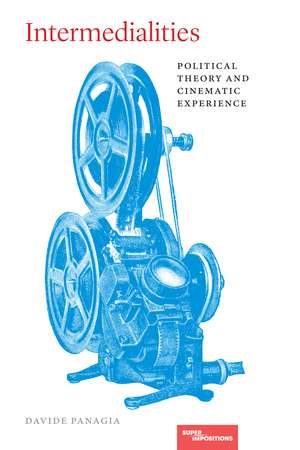Intermedialities: Political Theory and Cinematic Experience: Superimpositions
Autor Davide Panagiaen Limba Engleză Paperback – 15 iul 2024
Shining new light on our understanding of cinema’s ways of political thinking, Intermedialities: Political Theory and Cinematic Experience puts modern political theory in conversation with the philosophy of film. Davide Panagia argues that there are no natural laws of association that can guarantee a template for democratic participation, as democracy is predicated not on stabilizing foundations but rather on the formation of expansive collectivities and institutions that are responsive to alterability. Instead, democracy requires a relational ontology, one that he elucidates by turning to philosophers of film like Stanley Cavell, Gilles Deleuze, Miriam Hansen, and Jean-Luc Godard—all of whom have articulated a political aesthetic of cinematic experience that is at once aspectual and compositional. Panagia reads these thinkers alongside a countertradition of modern political thought, represented by David Hume, Ludwig Wittgenstein, and Gilbert Simondon. His articulation of cinematic experience thus allows for a political aesthetic that is rooted in the migratory realities of undetermined relations.
Preț: 222.42 lei
Nou
Puncte Express: 334
Preț estimativ în valută:
42.56€ • 44.75$ • 35.17£
42.56€ • 44.75$ • 35.17£
Carte indisponibilă temporar
Doresc să fiu notificat când acest titlu va fi disponibil:
Se trimite...
Preluare comenzi: 021 569.72.76
Specificații
ISBN-13: 9780810147102
ISBN-10: 0810147106
Pagini: 168
Dimensiuni: 152 x 229 x 13 mm
Greutate: 0.23 kg
Editura: Northwestern University Press
Colecția Northwestern University Press
Seria Superimpositions
ISBN-10: 0810147106
Pagini: 168
Dimensiuni: 152 x 229 x 13 mm
Greutate: 0.23 kg
Editura: Northwestern University Press
Colecția Northwestern University Press
Seria Superimpositions
Notă biografică
DAVIDE PANAGIA is a professor and chair of the Department of Political Science at the University of California, Los Angeles.
Cuprins
Acknowledgments
Introduction: Political Theory and Cinematic Experience
Chapter 1: Intermediality and the Moviola
Chapter 2: An Intermediality of Adveniences
Chapter 3: Intermedial Relations
Chapter 4: An Intermediality of Aspects
Coda: Politics, Criticism, and the Intermediality of Cinematic Experience
Notes
Bibliography
Introduction: Political Theory and Cinematic Experience
Chapter 1: Intermediality and the Moviola
Chapter 2: An Intermediality of Adveniences
Chapter 3: Intermedial Relations
Chapter 4: An Intermediality of Aspects
Coda: Politics, Criticism, and the Intermediality of Cinematic Experience
Notes
Bibliography
Recenzii
“How does cinematic experience orient our senses to new configurations of politics, of being, of doing? Davide Panagia's deep and wide knowledge of cinematic form, media studies, and political theory inform his brilliant, compelling, cutting-edge approach.” —Lori Marso, Union College
"Moving fluidly between film theory and political theory, Davide Panagia asserts that both movies and democratic institutions—at least, at their best—have a built-in slipperiness, a radical openness, that allows them to attend to shifting circumstances, to propose unforeseen inventions, and to stimulate joyful, collective engagement." —Steven Shaviro, Wayne State University
“Essential and exhilarating reading for anyone who wants to rethink the power of cinema—past and future—and to do so by starting from relations rather than identities, dispositions rather than substances. This is a timely, daring, and committed intervention into a novel ontology of the moving image, one that does not need to choose between aesthetics and politics but instead thrives on investigating their constitutive entanglement.” —Domietta Torlasco, Northwestern University
"Moving fluidly between film theory and political theory, Davide Panagia asserts that both movies and democratic institutions—at least, at their best—have a built-in slipperiness, a radical openness, that allows them to attend to shifting circumstances, to propose unforeseen inventions, and to stimulate joyful, collective engagement." —Steven Shaviro, Wayne State University
“Essential and exhilarating reading for anyone who wants to rethink the power of cinema—past and future—and to do so by starting from relations rather than identities, dispositions rather than substances. This is a timely, daring, and committed intervention into a novel ontology of the moving image, one that does not need to choose between aesthetics and politics but instead thrives on investigating their constitutive entanglement.” —Domietta Torlasco, Northwestern University
Descriere
Understanding democracy through film philosophy and political theory



